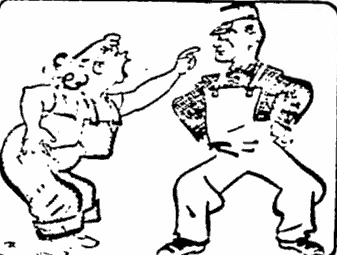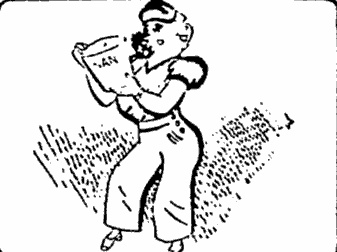The Pittsburgh Press (March 25, 1942)
CANDIDLY SPEAKING —
This is no time for ‘battle of sexes’
By Maxine Garrison
In England, men have mustered a movement against the hypothetical dominance of women in the post-war world.
In this country, the men in at least one industrial plant have promised to strike if women, being brought in for the duration, are paid wages as high as those now customary for the work.
A Los Angeles woman commander of a volunteer group, demoted because of “pink tea” activities, walked out entirely, taking her gang with her, and is organizing a rival group in protest against the “totalitarian rule” which ordered her demotion.
…Thus blow the straws of the wind.
If I may say so, this is one heck of a time for the battle of the sexes to break out with a vigor not seen since the days of the original “Bloomer Girls.”

To have war raging in a vast Pacific and Far East theater, throughout Europe and part of Africa, and across the Atlantic to American coastal waters was not enough for these strange peoples of the middle 20th century.
‘They began to squabble’
In the midst of the great war effort toward one common goal, they began to squabble among themselves. One group in its rivalry with another chose to impede the work of that other, rather than shelve its own immediate selfish considerations in the interests of survival.
One of the most curious of these internal festerings was the feud which arose between the sexes, even while individual romance and marriage flourished as usual, if not with increased fervor.
Men knew that women would have to take over men’s jobs at home for a while. But they feared that if women received equal salaries, it would be an insult to themselves (It might be noted, in passing, how strange it was they did not realize that for women to be paid less for the same work would tend to bring down men’s salaries down, too).
Men knew, too, that women had the same concern as themselves in the outcome of the war, and were willing to shoulder any necessary burden. Yet they were afraid that women might measure up too well, and seemed more anxious to keep power from falling into feminine hands than to accept the help women offered.

Like study clubs
Many women, in turn, were wont to carry on war work with the same methods and manners they had used for bridge parties and literature study clubs. According to contemporary reports, they acted as if the whole war were a show being put on or their special benefit, to give them a chance to act important. They were willing to forego the real benefits in favor of private bickering.
Of this period, it may be said:
They could not see the forest of the ultimate good of civilization for the trees of individual selfishness and personal glory.
…At this point, no one can predict just what the historian would add – whether the petty feuds were forgotten in favor of the best interests of the whole people, or whether they bogged down the national effort, seriously hampering it.
That final sentence is up to us, and it’s high time we made up our minds which we prefer.